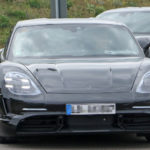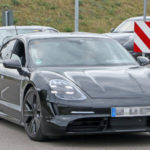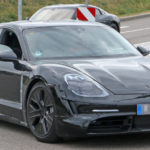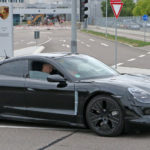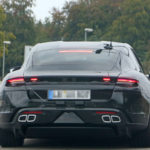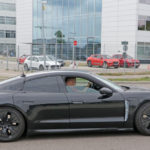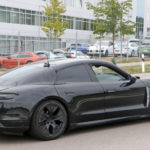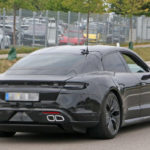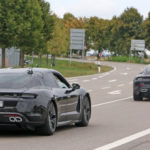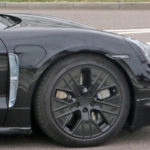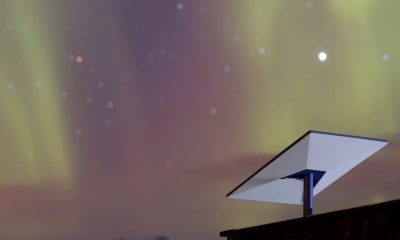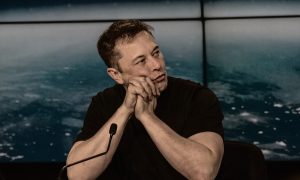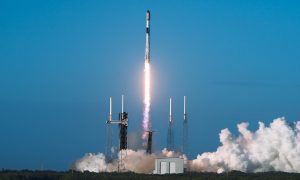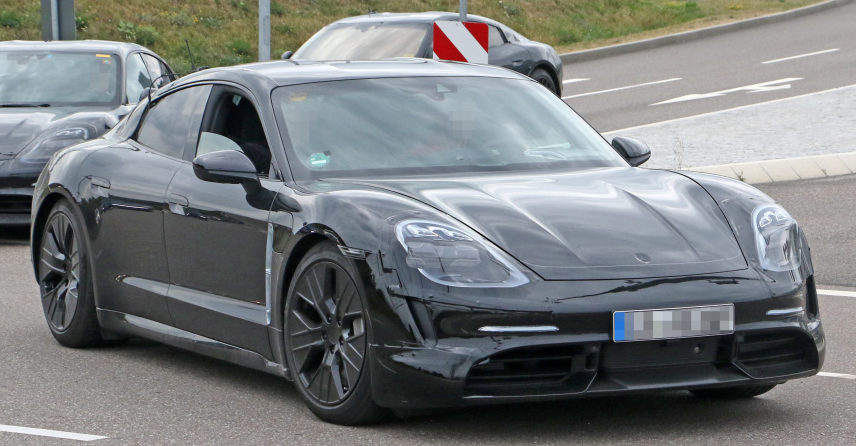

News
Porsche Taycan prototypes spotted with less camo, updated tail lights, aero-focused wheels
Porsche has taken a step forward in its road tests for the Taycan, as prototypes of the German automaker’s first all-electric car were recently sighted sporting less camouflage, new tail lights, new headlight accents, and new wheels. The new Taycan prototypes look more refined and production-ready than the previous test mules the legacy automaker has been utilizing in its road and track tests for the upcoming vehicle.
The updated Taycan prototypes were recently photographed by CarPix, a group that tracks vehicles that are currently under development. Immediately noticeable in the new Taycan images is the reduced amount of camouflage used the cars. The headlights of some of the prototypes, for one, appear to still be covered with stickers, but the tail lights of the electric cars were already connected with an illuminated horizontal strip between them. This makes the updated prototypes’ rear appear very similar to that of the Mission E sedan concept car.
- Porsche drops some camouflage from its Taycan prototypes. [Credit: CarPix/Facebook]
- Porsche drops some camouflage from its Taycan prototypes. [Credit: CarPix/Facebook]
- Porsche drops some camouflage from its Taycan prototypes. [Credit: CarPix/Facebook]
- Porsche drops some camouflage from its Taycan prototypes. [Credit: CarPix/Facebook]
- Porsche drops some camouflage from its Taycan prototypes. [Credit: CarPix/Facebook]
The Porsche Taycan’s new test mules, showing the vehicle’s updated tail lights and aero wheels. [Credit: CarPix/Facebook]
Also notable in the updated Taycan test mules were the vehicles’ wheels, which seem to be bigger and more aero-focused than before. Auto publication Top Speed, which claimed to have gained information about the prototypes, stated that they were informed the aero-focused wheels would likely make it to the production model. That being said, offering aero wheels for the Taycan makes perfect sense for Porsche, considering that they could optimize the range of the electric car. Tesla’s Aero Wheels for the Model 3, for one, is capable of increasing the sedan’s efficiency by ~10%.
Perhaps the most peculiar aspect of the updated Taycan prototypes were its fake exhausts. Being an all-electric car, the Taycan does not need an exhaust at all, and over the past months, it was thought that the test mules’ dummy exhaust pipes were just fitted on the vehicle to throw off onlookers. The updated Taycan prototypes still featured faux exhaust outlets, and what’s more, some cars actually had different types of exhaust outlets.
- Porsche drops some camouflage from its Taycan prototypes. [Credit: CarPix/Facebook]
- Porsche drops some camouflage from its Taycan prototypes. [Credit: CarPix/Facebook]
- Porsche drops some camouflage from its Taycan prototypes. [Credit: CarPix/Facebook]
- Porsche drops some camouflage from its Taycan prototypes. [Credit: CarPix/Facebook]
- Porsche drops some camouflage from its Taycan prototypes. [Credit: CarPix/Facebook]
The Porsche Taycan’s new test mules, showing the vehicle’s updated tail lights and aero wheels. [Credit: CarPix/Facebook]
The Porsche Taycan is the German automaker’s long-awaited response to the Tesla Model S sedan. The all-electric car is equipped with two permanently excited synchronous motors (PSM), which are expected to produce up to 600 hp. Porsche notes that the Taycan would feature a 0-60 mph time of 3.5 seconds and a top speed of 155 mph. While these figures fall below the performance stats of the Tesla Model S P100D, Porsche notes that the Taycan would be capable of being driven hard on the track for extended periods of time.
Porsche expects to start the production of the Taycan sometime next year, with deliveries likely hitting their stride in 2020. To prepare for the all-electric car’s rollout, Porsche is building a network of Charging Parks, which are similar to Tesla’s Supercharger Network, that would allow drivers to charge their vehicles rapidly. Porsche plans to produce the Taycan at its Zuffenhausen facilty — the same factory that manufactures the Porsche 911, 718 Boxster, as well as the 718 Cayman. The company is aiming to manufacture 20,000 Taycans every year.
News
Tesla begins Robotaxi certification push in Arizona: report
Tesla seems serious about expanding its Robotaxi service to several states in the coming months.

Tesla has initiated discussions with Arizona transportation regulators to certify its driverless Robotaxi service in the state, as per a recent report from Bloomberg News. The move follows Tesla’s launch of its Robotaxi pilot program in Austin, Texas, as well as CEO Elon Musk’s recent comments about the service’s expansion in the Bay Area.
The Arizona Department of Transportation confirmed to Bloomberg that Tesla has reached out to begin the certification process for autonomous ride-sharing operations in the state. While details remain limited, the outreach suggests that Tesla is serious about expanding its driverless Robotaxi service to several territories in the coming months.
The Arizona development comes as Tesla prepares to expand its service area in Austin this weekend, as per CEO Elon Musk in a post on X. Musk also stated that Tesla is targeting the San Francisco Bay Area as its next major market, with a potential launch “in a month or two,” pending regulatory approvals.
Tesla first launched its autonomous ride-hailing program on June 22 in Austin with a small fleet of Model Y vehicles, accompanied by a Tesla employee in the passenger seat to monitor safety. While still classified as a test, Musk has said the program will expand to about 1,000 vehicles in the coming months. Tesla will later upgrade its Robotaxi fleet with the Cyercab, a two-seater that is designed without a steering wheel.
Sightings of Cybercab castings around the Giga Texas complex suggests that Tesla may be ramping the initial trial production of the self-driving two-seater. Tesla, for its part, has noted in the past that volume production of the Cybercab is expected to start sometime next year.
In California, Tesla has already applied for a transportation charter-party carrier permit from the state’s Public Utilities Commission. The company is reportedly taking a phased approach to operating in California, with the Robotaxi service starting with pre-arranged rides for employees in vehicles with safety drivers.
News
Tesla sets November 6 date for 2025 Annual Shareholder Meeting
The automaker announced the date on Thursday in a Form 8-K.

Tesla has scheduled its 2025 annual shareholder meeting for November 6, addressing investor concerns that the company was nearing a legal deadline to hold the event.
The automaker announced the date on Thursday in a Form 8-K submitted to the United States Securities and Exchange Commission (SEC). The company also listed a new proposal submission deadline of July 31 for items to be included in the proxy statement.
Tesla’s announcement followed calls from a group of 27 shareholders, including the leaders of large public pension funds, which urged Tesla’s board to formally set the meeting date, as noted in a report from The Wall Street Journal.
The group noted that under Texas law, where Tesla is now incorporated, companies must hold annual meetings within 13 months of the last one if requested by shareholders. Tesla’s previous annual shareholder meeting was held on June 13, 2024, which placed the July 13 deadline in focus.
Tesla originally stated in its 2024 annual report that it would file its proxy statement by the end of April. However, an amended filing on April 30 indicated that the Board of Directors had not yet finalized a meeting date, at least at the time.
The April filing also confirmed that Tesla’s board had formed a special committee to evaluate certain matters related to CEO Elon Musk’s compensation plan. Musk’s CEO performance award remains at the center of a lengthy legal dispute in Delaware, Tesla’s former state of incorporation.
Due to the aftermath of Musk’s legal dispute about his compensation plan in Delaware, he has not been paid for his work at Tesla for several years. Musk, for his part, has noted that he is more concerned about his voting stake in Tesla than his actual salary.
At last year’s annual meeting, TSLA shareholders voted to reapprove Elon Musk’s compensation plan and ratified Tesla’s decision to relocate its legal domicile from Delaware to Texas.
Elon Musk
Grok coming to Tesla vehicles next week “at the latest:” Elon Musk
Grok’s rollout to Tesla vehicles is expected to begin next week at the latest.

Elon Musk announced on Thursday that Grok, the large language model developed by his startup xAI, will soon be available in Tesla vehicles. Grok’s rollout to Tesla vehicles is expected to begin next week at the latest, further deepening the ties between the two Elon Musk-led companies.
Tesla–xAI synergy
Musk confirmed the news on X shortly after livestreaming the release of Grok 4, xAI’s latest large language model. “Grok is coming to Tesla vehicles very soon. Next week at the latest,” Musk wrote in a post on social media platform X.
During the livestream, Musk and several members of the xAI team highlighted several upgrades to Grok 4’s voice capabilities and performance metrics, positioning the LLM as competitive with top-tier models from OpenAI and Google.
The in-vehicle integration of Grok marks a new chapter in Tesla’s AI development. While Tesla has long relied on in-house systems for autonomous driving and energy optimization, Grok’s integration would introduce conversational AI directly into its vehicles’ user experience. This integration could potentially improve customer interaction inside Tesla vehicles.
xAI and Tesla’s collaborative footprint
Grok’s upcoming rollout to Tesla vehicles adds to a growing business relationship between Tesla and xAI. Earlier this year, Tesla disclosed that it generated $198.3 million in revenue from commercial, consulting, and support agreements with xAI, as noted in a report from Bloomberg News. A large portion of that amount, however, came from the sale of Megapack energy storage systems to the artificial intelligence startup.
In July 2023, Musk polled X users about whether Tesla should invest $5 billion in xAI. While no formal investment has been made so far, 68% of poll participants voted yes, and Musk has since stated that the idea would be discussed with Tesla’s board.
-

 Elon Musk1 week ago
Elon Musk1 week agoTesla investors will be shocked by Jim Cramer’s latest assessment
-

 Elon Musk3 days ago
Elon Musk3 days agoElon Musk confirms Grok 4 launch on July 9 with livestream event
-

 Elon Musk14 hours ago
Elon Musk14 hours agoxAI launches Grok 4 with new $300/month SuperGrok Heavy subscription
-

 News7 days ago
News7 days agoTesla Model 3 ranks as the safest new car in Europe for 2025, per Euro NCAP tests
-

 Elon Musk2 weeks ago
Elon Musk2 weeks agoA Tesla just delivered itself to a customer autonomously, Elon Musk confirms
-

 Elon Musk1 week ago
Elon Musk1 week agoxAI’s Memphis data center receives air permit despite community criticism
-

 Elon Musk2 weeks ago
Elon Musk2 weeks agoTesla’s Omead Afshar, known as Elon Musk’s right-hand man, leaves company: reports
-

 News2 weeks ago
News2 weeks agoXiaomi CEO congratulates Tesla on first FSD delivery: “We have to continue learning!”

